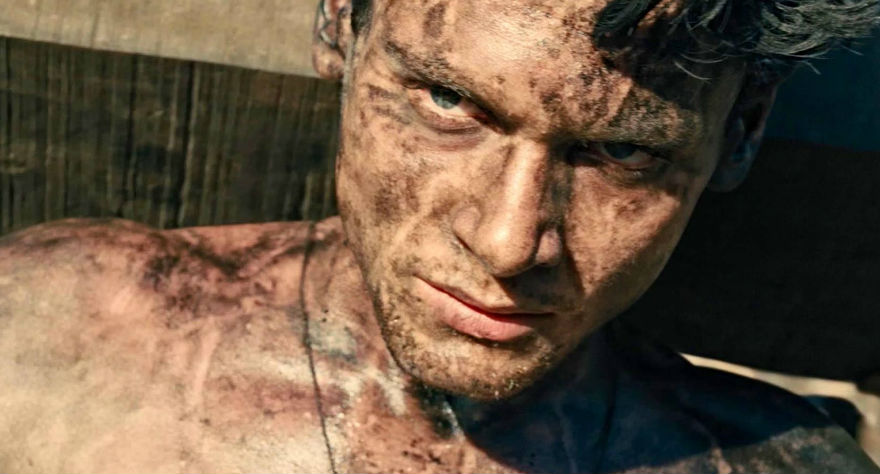
Jolie's POW drama is too polite to its subject, preferring to emphasize nobility over the truth of misery and torture.

Jolie's POW drama is too polite to its subject, preferring to emphasize nobility over the truth of misery and torture.
Unbroken‘s most hard-to-watch, brutal scenes see WWII U.S. Airforce bombadier Louis Zamperini (played by a commanding Jack O’Connell) getting thrashed and beaten to oblivion at the hands of a sadistic Japanese prison sergeant called “The Bird” (Japanese singer Miyavi). Over and over again, we see The Bird torture and ridicule Zamperini, and over and over again we watch the Italian-American soldier endure. About the resilience of one man’s mind, body, and spirit in the face of unending pain and indignity, Angelina Jolie‘s POW prestige piece (“a true story”, according to the film’s intro) is an excruciating watch, but the too neatly-packaged structuring and presentation act as something of a blockade between us and Zamperini’s mind. Never do we feel like we’re experiencing his suffering with him; we’re watching from behind the glass of an exhibit at the Hollywood History museum.
An olympic runner before his stint carpet bombing Japanese bases from the Southern Pacific skies and getting in dogfights with Zero planes, Zamperini was aboard a B-24 along with a handful of comrades when it crashed in the middle of the ocean. He along with remaining survivors Francis “Mac” McNamara (Finn Wittrock) and Alan “Phil” Phillips (Domhnall Gleeson), survived for over a month on a raft, dodging fighter plane fire and hungry sharks. “Mac” didn’t make it past day 33, but Louie (as his friends called him) and “Phil” held out for two more weeks before being apprehended by an enemy naval ship. From the moment Louie stepped foot in the Japanese prison until the end of the war, he was treated like trash, kicked in the stomach, punched in the face from sunup ’til sundown by his fellow American captors (they were forced to by The Bird, as part of one of his sick torture strategies), and subjected to all manner of mental and physical abuse. He weathered the storm like only a hero could, and when the war (and the beatings) ended, he went on to raise a happy family and live to the age of 97. (He died last year of pneumonia.)
Zamperini’s story (told in the autobiography written by Laura Hillenbrand the movie is based on) is as awe-inspiring as any you’ll hear, but Jolie and screenwriters Joel and Ethan Coen (yes, they do write scripts once every blue moon) take a storytelling approach that’s too rudimentary and overly respectful. Unbroken should feel like a horror movie (I can’t imagine a more frightening existence than Zamperini’s time in the prison), but instead feels like a pedestrian, gussied-up biopic. Flashbacks to Zamperini’s youth are so overly poetic sometimes it feels icky. “A moment of pain is worth a lifetime of glory,” his brother says to him with perfect diction as he rolls away on a train to go to war.
Cinematographer Roger Deakins (one of the greats) does what he usually does and composes some stunning, immaculate images. What I wonder, though, is if Jolie’s influence caused Deakins to pretty up the movie’s aesthetic a bit too much; some close-up shots of O’Connell, even when he’s being smashed in the face, feel too glossy and borderline-glamorous for the subject matter. Whether this was Jolie’s artistic choice, Deakins’, or both, the beautifully-lit, unadventurous visuals don’t pair well with the crushing misery Zamperini lived in, nor does the moody, melodramatic score.
What the Hollywood, restrained style does speak to very well, though, is Zamperini’s abnormal level of nobility. O’Connell is wonderful, the definition of a leader, a man whose shoulders could hold up a nation. In one of the film’s most advertised scenes, The Bird forces a starving, injured Zamperini to hold up a steel beam above his head, ordering his lackey to kill him if he drops it. Portraying her subject in an overtly Christ-like fashion wasn’t the most palatable choice in my estimation; when O’Connell pushes the beam up to the heavens overhead and roars with primal rage at his tormentor The Bird, the film abandons its anchor in reality and things get uncomfortable. You can’t fault O’Connell, though, as he gives every scene his all, no matter how cringe-worthy the material gets. Miyavi is a perfect heel in his screen debut, exuding an almost sexual delight when punishing his hapless prisoners. There’s a palpable spark between the two young actors and for any scene that’s successful in earning Zamperini sympathy, Miyavi deserves half the credit.